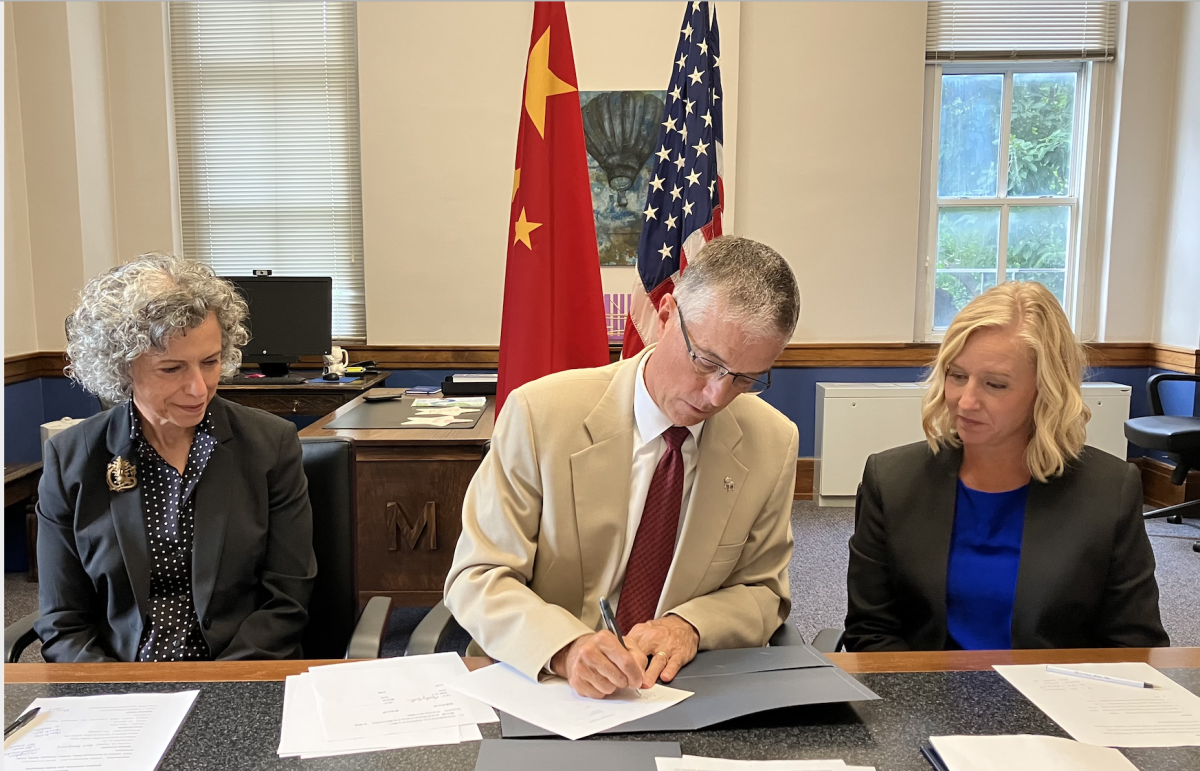Drake President Marty Martin and Qingdao University Vice President Li Jun have signed an agreement supporting the creation of new joint degree programs. Drake Provost Sue Mattison hopes the programs will open in fall 2023 or fall 2024.
Hannah Sappenfield of Drake’s Global Engagement Office said the universities’ signed Memorandum of Understanding is “really just a way to open the door to explore specific areas of cooperation.”
In the MOU, the universities agree that they want to develop a relationship that supports joint degree programs and potentially additional opportunities, like faculty and staff development and collaborative research.
“It’s challenging because it is, I think, very much still in progress,” said Sappenfield, the assistant director for global partnerships. “But I think it’s a positive step that we have our MOU signed.”
Qingdao has expressed interest in developing three joint degrees with Drake: data analytics, biology, and psychology, Mattison said in the faculty senate meeting on Sept. 21. As of Sept. 21, Drake’s data analytics faculty were planning to be part of the collaboration, while biology and psychology wanted more information before deciding.
“We’re really at the stage of just being open to it and committed to finding a way that can make it work, if such a way can be found,” said Eric Manley, co-director of Drake’s data analytics program.
Mattison said in faculty senate that “hundreds of these kinds of collaborations currently exist across the United States.”
“The way [the partnership] will start is in China,” Mattison said in an interview. “So it wouldn’t be Qingdao students coming to Drake, it would be a Drake faculty member from each of those programs going to Qingdao to teach some of the classes… and also the AOIs.”
Sappenfield said over email that under current plans, Drake students won’t be eligible for the joint degree programs. There are no specific plans in place yet for Qingdao faculty to visit Drake as guest lecturers or scholars-in-residence, but this could happen in the future, she said.
“Drake students would not be eligible for this specific activity, but there may be different opportunities in the future for Drake students,” Sappenfield said.
Additionally, Manley said Drake will probably have to hire new faculty in order to staff data analytics courses in the U.S. and China at the same time.
In faculty senate, Mattison said that Drake’s reputation in undergraduate education and affiliation with Terry Branstad led to the partnership. Branstad is a former Iowa governor and U.S. Ambassador to China, and he became the university’s ambassador-in-residence in November.
“He has quite a bit of recognition across China, and I think his connection to Drake as an alumni [sic] really helps in this case,” Sappenfield said.
A potential concern
During the faculty senate meeting, political science professor David Skidmore raised a question about the data analytics joint degree.
“Any collaboration with a Chinese institution with respect to data analytics should give due consideration to some of the serious concerns that have been raised about how the Chinese state used big data for surveillance purposes,” Skidmore wrote in a chat message during the faculty senate Zoom meeting.
Skidmore has taught U.S.-China relations at Drake, and last year he incorporated his podcast “U.S.-China: Searching for Common Ground” into a class, The Times-Delphic reported in March 2021.
In reply to Skidmore’s message, Martin said “there’s lots of things to balance in a collaboration with China these days.”
“Education can be one of those places where that citizen diplomacy can be particularly effective,” Martin said. “But we go into it not naive, with eyes wide open.”
According to the Council on Foreign Relations, the Chinese government uses artificial intelligence to create lists of “so-called suspicious people.” Leaked documents published by the International Consortium of Investigative Journalists showed that over seven days in June 2017, over 15,000 residents of Xinjiang were placed in detention centers after the algorithm flagged them, according to the CFR.. About 11 million Uyghurs, a mostly Muslim ethnic group that has been repressed by China, live in northwestern Xinjiang.
Manley said that while a student who goes on to work for the Chinese government might use Drake’s data analytics training in ways that Drake wouldn’t agree with, a student could also work for a corporation “that would misuse people’s data, that would violate their privacy and so on.”
Manley also said that data and computer ethics are part of the curriculum. He said that if Drake were challenged about material critical of China in its coursework, the university would not remove it. If that were to happen, it would probably lead to the end of the joint data analytics degree, he said.
“We hope that you’re becoming a person who can use those skills critically,” Manley said. “[Who] knows when it’s appropriate to use them, how to use them and then hopefully also understands values of privacy and so forth.”
Future developments
Sappenfield said there will be a curriculum mapping process for the joint degrees. This next step will determine which classes must be taught by Drake faculty to receive a Drake degree.
Under the MOU, the universities will revisit the agreement in two years to decide whether or not they want to renew, cancel or modify it.
Sappenfield said that “our overall MOU and our partnership allows for all sorts of collaboration.”







